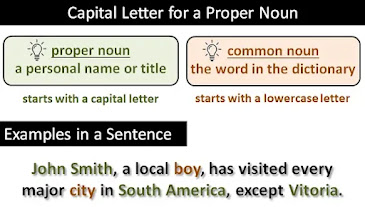
Why is it wrong to capitalize common nouns in the middle of a sentence?-Grammar Puzzle Solved (29)
Capitalize Common Nouns in the Middle of a Sentence
Answer:
In English grammar, common nouns refer to general categories or types of people, places, things, animals, or ideas. Words like teacher, city, dog, freedom, and school all qualify as common nouns. These nouns name general items rather than specific ones. In contrast, proper nouns identify specific individuals or places—such as John, Paris, or Amazon—and always require capitalization.
Writers often feel tempted to capitalize common nouns in the middle of a sentence, especially when they want to emphasize importance. However, this habit creates grammatical errors and disrupts the flow of formal writing. The basic rule is simple: only capitalize common nouns when they start a sentence or appear in a proper noun.
Let’s look at this common mistake more closely.
🔍 Common Errors and Their Corrections
❌ Incorrect:
- The Dog ran across the street.
- She wants to become a Nurse.
- They traveled to the City for the event.
- A group of Students arrived early.
✅ Correct:
- The dog ran across the street.
- She wants to become a nurse.
- They traveled to the city for the event.
- A group of students arrived early.
Each incorrect version capitalizes a noun unnecessarily. These words—dog, nurse, city, and students—are not proper nouns. They refer to general categories, not specific names.
💡 Why Capitalization Matters
Incorrect capitalization makes your writing appear careless or unprofessional. It can also confuse readers and disrupt sentence flow. In academic essays, professional emails, and formal articles, grammar precision reflects credibility and attention to detail. Misusing capital letters can signal weak grammar skills or a lack of understanding.
Moreover, tools like Grammarly or style checkers may flag these errors, reducing your writing score or credibility in formal assessments.
✅ Quick Guidelines to Follow
To avoid this mistake, remember:
- Capitalize only when the noun starts a sentence.
- Capitalize if it is part of a proper noun (e.g., Lake Victoria, Mount Everest).
- Do not capitalize for emphasis or visual effect in standard writing.
🎯 Final Thoughts
Mastering the difference between common and proper nouns helps you write with clarity and accuracy. When you stop capitalizing common nouns inappropriately, your writing improves in both professionalism and polish. Whether you write an academic paper, blog post, or business document, consistency in grammar always builds trust and authority. Keep your capital letters where they belong—and your sentences will shine.

To read the History of English Literature, follow the link: https://englishlitnotes.com/category/history-of-english-literature/
To read the Moral Story, The Foolish Stag, follow the link: https://englishwithnaeemullahbutt.com/2025/05/01/the-foolish-stag/
Grammar Puzzle Solved: https://grammarpuzzlesolved.englishlitnotes.com/category/grammar-puzzle-solved-by-naeem-sir/
For grammar lessons, visit ChatGPT to explore the platform and interact with the AI: https://chat.openai.com
Discover more from Grammar Puzzle Solved by Naeem Ullah Butt
Subscribe to get the latest posts sent to your email.